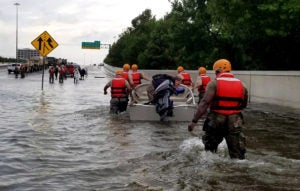
Since Hurricane Harvey first made landfall, it’s been humbling and encouraging to see the outpouring of generosity, courage and resilience displayed by Texans in response to this disaster. Texans take pride in individual resilience; how tough we are and how quickly we bounce back from challenges. Hurricane Harvey is certainly a test for our resilience, not only as individuals, but as a community.
But resilience doesn’t happen in a vacuum. Part of our responsibility to one another in times of crisis is to use the opportunity to push for far-reaching changes so that resilience is more than just a quality we admire in individuals, but an organic principle of the systems and services that exist to meet a community’s needs.
The mental health implications created by crisis are long-term and not nearly as visible as the ravaged landscape left behind by Hurricane Harvey. Though Texans may be tough, how resilient are Texas communities, particularly when it comes to supporting mental health, and what needs to change?
Recovery from Hurricane Harvey will take time, as does recovery in mental health. September is National Recovery Month within the behavioral health field, so there’s no better time to shine a spotlight on the meaning and value of recovery in mental health. Recovery in mental health is built on core concepts of connectedness, hope, identity and resilience. In Texas, the Hogg Foundation for Mental Health has been on the forefront of the recovery movement, funding a variety of initiatives to embed the recovery model of care throughout Texas.
One such initiative, called Recovery to Practice (RTP), aims to infuse recovery principles into the practices of six behavioral health professions: psychology, psychiatry, nursing, social work, peer support and addiction counseling. The end goal is to have more professionals and care environments approaching serious mental illness with the understanding that people can and do recover, and turning to a professional for answers should not mean signing away one’s autonomy and self-respect.
In 2015, the Hogg Foundation launched the RTP initiative to support the dissemination of recovery curriculum across Texas through each of the six behavioral health professions. The six grantees included American Psychiatric Nurses Association-Texas Chapter, University of North Texas Department of Disability and Addiction Rehabilitation, the University of Texas at Arlington School of Social Work, the University of Texas Health Science Center at San Antonio, and Via Hope Texas. These groups act as conduits for recovery principles to be spread through numerous online and in-person trainings around the state.
“I didn’t think people could recover from mental illness, especially with diagnoses like schizophrenia or bipolar disorder. I was taught – back in the day – that you just weren’t going to get better,” explains Allyn Collins, a psychiatric nurse from Dallas with 30 years’ experience and a recipient of RTP training via American Psychiatric Nurses Association Texas Chapter. “The (RTP) curriculum is pertinent to the care of people throughout the hospital. Every nurse is a psychiatric nurse. People with schizophrenia have heart attacks and people with bipolar disorder have babies. We see patients with mental health disorders in every specialty in healthcare.”
Believing that people with mental illness are doomed and without hope can have deadly consequences. As of 2012, U.S. adults with schizophrenia can expect to live a full 20 years shorter than those without such a diagnosis. Stigma leads to shame, which leads to alienation, which leads to people being cut off from connections and resources that would make a difference.
What we learned from Hurricane Katrina, and what we’re likely to learn again from Harvey, is that natural disasters do more than just catch individuals and communities off guard. They make systemic inequities brutally apparent. One way to combat this and improve the resilience of our communities is to train and deploy a behavioral health workforce that is person-centered, and in which mental and physical health needs are given equal footing. The RTP initiative and recovery curriculum do just that.
What if the concepts of recovery and hope for a fulfilling and meaningful life despite serious mental illness were shared by a majority of Texans? What would that mean for our communities? The principles of mental health recovery, combined with a corps of caring professionals who put them into practice, are critical to help people bounce back from Harvey and to strengthen the resilience of communities across Texas.
